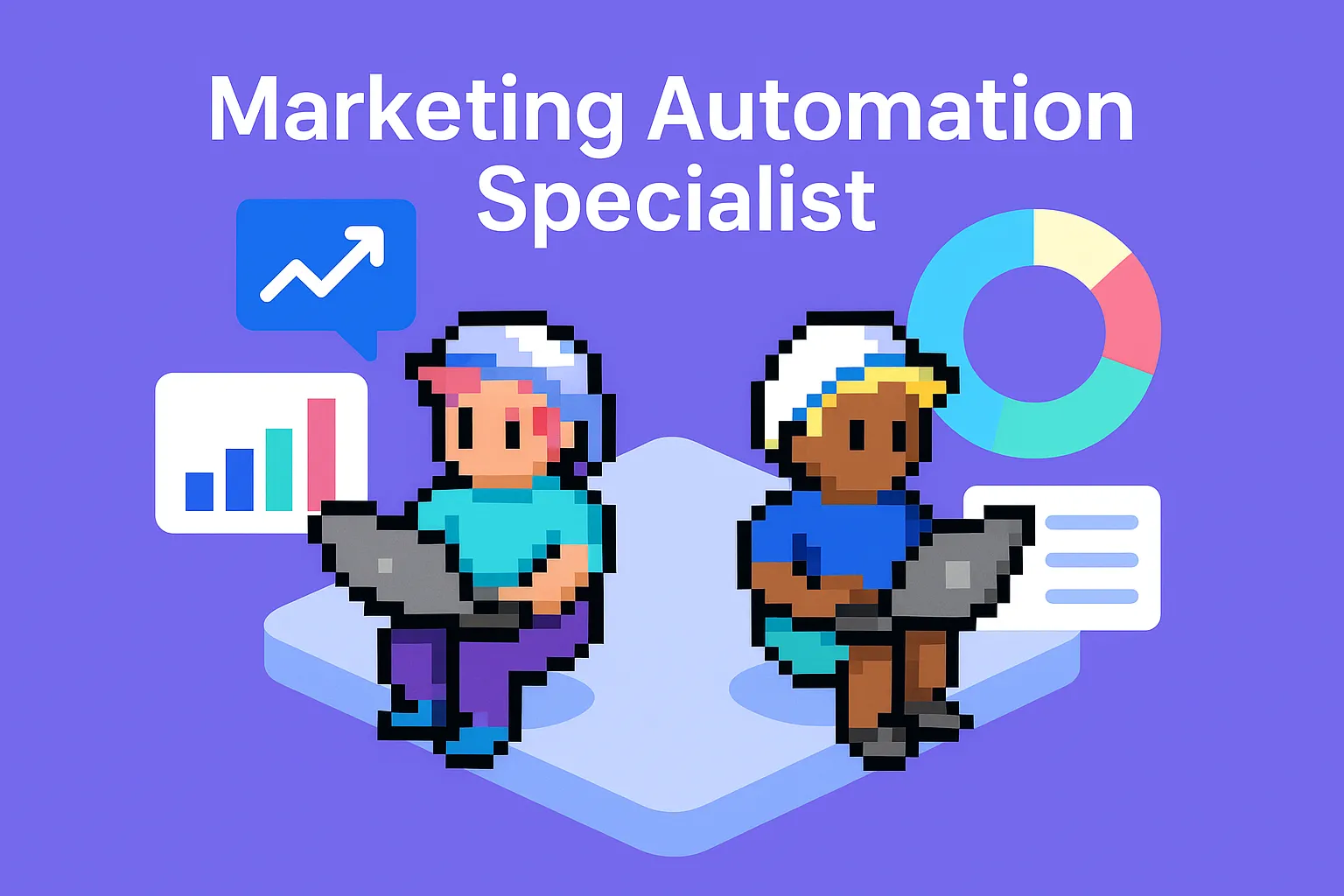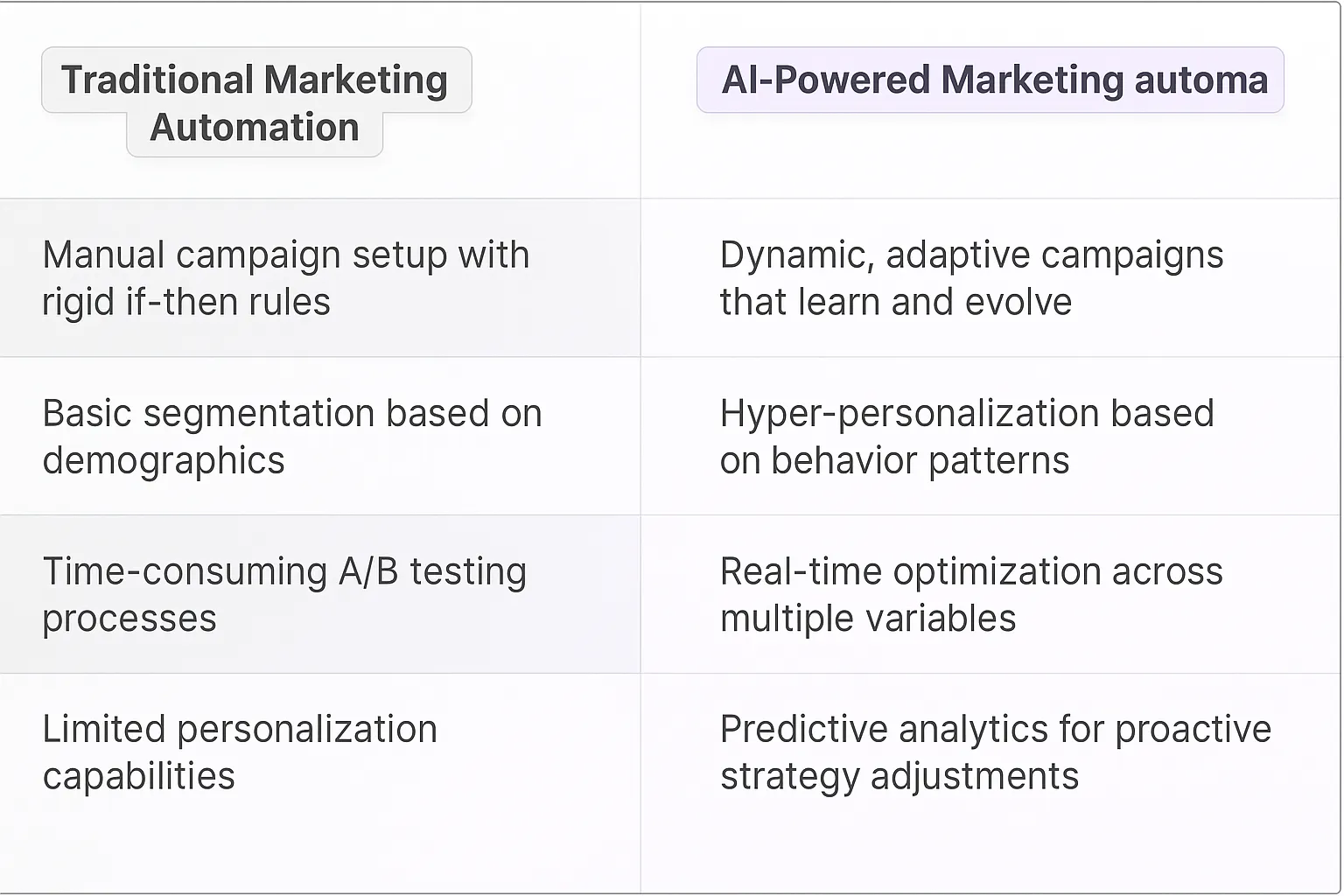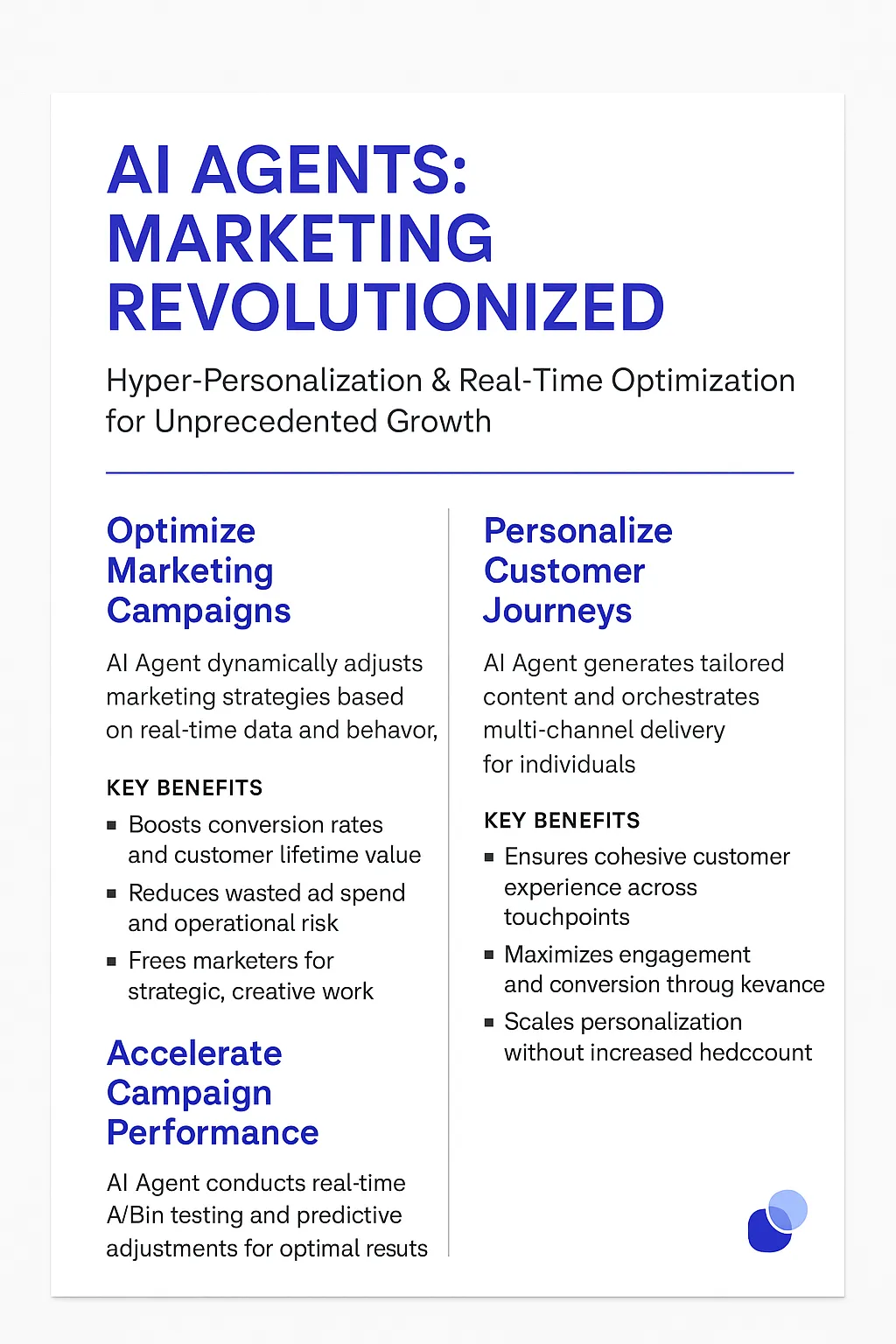Marketing Automation Specialist is a cutting-edge AI-powered system designed to supercharge marketing efforts. It's not just another tool in the marketer's arsenal - it's a digital teammate that works alongside human marketers to handle complex, data-driven tasks. This AI agent can analyze customer data, optimize campaigns, personalize content, and even predict future trends, all at a scale and speed that would be impossible for humans alone.
The Marketing Automation Specialist comes packed with features that set it apart from traditional marketing tools:1. Advanced data analysis: It can process and derive insights from vast amounts of customer data across multiple touchpoints.2. Real-time optimization: The AI continuously monitors campaign performance and makes instant adjustments to improve results.3. Hyper-personalization: It creates individualized customer experiences by analyzing behavior patterns and preferences.4. Predictive analytics: The system can forecast trends and customer behaviors, allowing for proactive strategy adjustments.5. Multi-channel orchestration: It seamlessly manages campaigns across various platforms, ensuring a cohesive customer journey.6. Automated A/B testing: The AI can run thousands of micro-tests simultaneously, rapidly iterating to find optimal solutions.These features combine to create a powerful ally for marketers, freeing them up to focus on high-level strategy and creativity while the AI handles the data-heavy lifting.

Before AI agents entered the marketing automation scene, we were stuck in a world of rigid, rule-based systems. Marketers had to manually set up complex if-then scenarios, hoping to capture every possible customer interaction. It was like trying to predict every move in a chess game before it even started.
These traditional tools were essentially glorified email schedulers with some basic segmentation capabilities. They couldn't adapt in real-time, learn from interactions, or truly personalize at scale. Marketers spent countless hours tweaking campaigns, analyzing data, and trying to squeeze insights from limited datasets.
Enter AI agents, and suddenly we're playing a whole new game. These digital teammates are like having a team of genius marketers working 24/7, constantly learning and optimizing.
First off, AI agents bring true personalization to the table. We're not talking about just inserting a customer's name into an email. These agents can analyze vast amounts of data - browsing history, purchase patterns, social media interactions - to create hyper-targeted campaigns that feel almost eerily relevant.
But here's where it gets really interesting: AI agents don't just execute pre-planned campaigns. They're constantly learning and adapting. If a particular message isn't resonating with a segment of your audience, the AI can pivot in real-time, testing new approaches until it finds what works.
This leads to another massive benefit: continuous optimization. In the old world, A/B testing was a manual, time-consuming process. AI agents can run thousands of micro-tests simultaneously, rapidly iterating to find the optimal mix of content, timing, and channel for each individual customer.
Perhaps most importantly, AI agents free up marketers to focus on strategy and creativity. Instead of getting bogged down in the minutiae of Campaign Optimization, marketers can zoom out and focus on big-picture thinking. The AI handles the grunt work, while humans can lean into what they do best: understanding human emotions, crafting compelling narratives, and dreaming up innovative campaigns.
Finally, AI agents bring a level of scalability that was previously unimaginable. They can manage millions of individual customer journeys simultaneously, each one unique and dynamically updated. This allows even small marketing teams to operate at enterprise scale, delivering personalized experiences to vast audiences without burning out.
In essence, AI agents are transforming marketing automation from a tool into a true partner. They're not just executing our commands; they're collaborating with us, bringing insights and capabilities that amplify human creativity and strategic thinking. It's a symbiosis that's redefining what's possible in marketing.
The power of Audience Segmentation through AI enables marketers to reach the right people with the right message at precisely the right moment.

Marketing automation is ripe for AI-driven enhancement. Digital teammates can take on complex, data-heavy tasks that traditionally bog down human marketers. Here's how AI agents can revolutionize marketing automation processes:
Beyond high-level processes, AI agents can handle numerous day-to-day tasks that consume marketers' time. Here's where they shine:
The integration of AI agents into marketing automation isn't just about efficiency—it's about unlocking new levels of personalization and effectiveness. As these digital teammates handle routine tasks and complex data analysis, human marketers can focus on strategy, creativity, and building genuine connections with customers. The result? A marketing function that's not just automated, but truly intelligent and adaptive.

Marketing automation specialist AI agents are reshaping the landscape of digital marketing across industries. These digital teammates aren't just tools; they're game-changers that are redefining how businesses approach their marketing strategies. Let's dive into some concrete, industry-specific examples that illustrate how these AI agents are transforming workflows and driving results.
From e-commerce to B2B tech, these AI-powered marketing automation specialists are proving their worth by tackling complex tasks, analyzing vast datasets, and delivering personalized experiences at scale. They're not replacing human marketers, but rather augmenting their capabilities, allowing teams to focus on high-level strategy while the AI handles the nitty-gritty details.
The following use cases demonstrate how these digital teammates are being leveraged to solve real-world marketing challenges, boost efficiency, and drive growth across different sectors. Each example showcases the unique ways AI agents are adapting to industry-specific needs and pushing the boundaries of what's possible in marketing automation.
Through advanced predictive analytics, these AI agents can forecast market trends and customer behaviors with unprecedented accuracy, enabling businesses to stay ahead of the competition.
The e-commerce industry is ripe for disruption by Marketing Automation Specialist AI agents. These digital teammates can transform how online retailers engage with customers, moving beyond basic segmentation to hyper-personalized, dynamic customer journeys.
Consider a mid-sized fashion retailer. Traditionally, they might segment customers based on broad categories like age, gender, and past purchases. But with a Marketing Automation Specialist AI agent, they can create intricate, adaptive customer profiles that evolve in real-time.
This AI agent doesn't just look at what a customer bought; it analyzes browsing patterns, time spent on product pages, abandoned carts, and even factors like local weather or upcoming events. It then crafts tailored marketing sequences for each individual.
For instance, if a customer frequently browses evening wear but rarely purchases, the AI might infer they're looking for a special occasion outfit. It could then trigger a sequence of emails showcasing styling tips, accessory pairings, and limited-time offers on formal attire.
The AI continuously learns from customer interactions, refining its approach. If a customer starts engaging more with sustainable fashion content, the AI pivots, emphasizing eco-friendly options in future communications.
This level of personalization, executed at scale, can significantly boost conversion rates and customer lifetime value. It's not just about sending the right message at the right time; it's about creating a unique, evolving dialogue with each customer that feels genuinely personal and valuable.
The real power lies in the AI's ability to orchestrate complex, multi-channel campaigns. It might start with an email, follow up with a personalized retargeting ad on social media, and then send a push notification about a flash sale on items the customer has shown interest in.
For e-commerce businesses, this represents a step-change in marketing capabilities. It's not just automation; it's intelligent, adaptive marketing that can keep pace with the rapidly changing preferences and behaviors of online shoppers.
Advanced Customer Journey Mapping capabilities enable these AI agents to understand and optimize every touchpoint in the customer experience, while sophisticated email marketing automation ensures the right message reaches customers at the perfect moment.
The real estate industry is primed for a marketing revolution, and Marketing Automation Specialist AI agents are the catalysts. These digital teammates are reshaping how realtors and agencies connect with potential buyers and sellers, moving beyond traditional CRM systems to create dynamic, personalized property journeys.
Take a mid-sized real estate agency operating in a competitive urban market. Historically, they might have relied on broad email blasts about new listings or generic follow-ups with leads. Enter the Marketing Automation Specialist AI, and suddenly they're playing a whole new game.
This AI doesn't just track basic metrics like property views or inquiry submissions. It's constantly analyzing a potential buyer's behavior across multiple touchpoints - website interactions, social media engagement, even the types of properties they linger on during virtual tours. It's building a nuanced profile of each lead's preferences, financial situation, and readiness to buy.
For instance, if a lead consistently looks at three-bedroom homes in family-friendly neighborhoods but hasn't made an inquiry, the AI might infer they're in the early stages of considering a move. It could then initiate a subtle nurturing campaign, sending curated content about school districts, family-oriented community events, or tips for first-time homebuyers.
The AI's real power shines in its ability to adapt in real-time. If a lead suddenly starts showing interest in investment properties, the AI pivots its approach. It might serve up content on rental yield calculations, property management tips, or even invite them to an exclusive webinar on real estate investing.
This level of personalization, executed at scale, can dramatically increase conversion rates and shorten sales cycles. It's not just about pushing listings; it's about becoming a trusted advisor in the complex, emotional journey of property buying or selling.
The AI's orchestration of multi-channel campaigns is where things get really interesting. It might start with a personalized email showcasing properties that match the lead's preferences, follow up with targeted social media ads highlighting neighborhood features they've shown interest in, and then prompt the agent to make a well-timed phone call when the AI detects high engagement signals.
For real estate businesses, this represents a quantum leap in marketing sophistication. It's not just automating follow-ups; it's creating an intelligent, adaptive marketing ecosystem that can keep pace with the nuanced, often non-linear journey of property seekers.
The end result? Higher quality leads, more efficient use of agents' time, and ultimately, more satisfied clients who feel truly understood and supported throughout their property journey. In a market where personal relationships and timing are everything, this AI-driven approach could be the difference between a thriving agency and one that's left behind.
Sophisticated Lead Nurturing strategies powered by AI ensure that potential clients receive the right information at the optimal time in their property search journey.
Implementing a Marketing Automation Specialist AI Agent isn't just about plugging in some code and watching the magic happen. It's a complex dance of data, algorithms, and integration that can make even seasoned tech veterans break out in a cold sweat.
First up, we're dealing with data fragmentation on a massive scale. Marketing data lives in countless silos - CRMs, analytics platforms, social media, email tools - you name it. Getting all this data to play nice together is like herding cats. The AI needs clean, consistent data to function effectively, but achieving that is often a Herculean task.
Then there's the issue of real-time processing. Marketing moves at the speed of social media these days. Your AI needs to crunch numbers and make decisions faster than a TikTok video goes viral. This requires some serious computational muscle and clever architecture to avoid latency issues that could render your automation efforts useless.
Let's not forget about the ever-evolving landscape of marketing channels. Your AI needs to be flexible enough to adapt to new platforms and changing consumer behaviors. It's not just about email anymore - we're talking omnichannel strategies that span everything from push notifications to VR experiences. Keeping your AI up to speed with these changes is a constant battle.
On the operational side, we're looking at a paradigm shift that many organizations aren't prepared for. Implementing an AI Marketing Automation Specialist isn't just a tech upgrade - it's a fundamental change in how marketing operates.
First, there's the skills gap. Your marketing team might be wizards at crafting compelling campaigns, but do they understand machine learning models or data science? You're suddenly asking marketers to become part-time data analysts, and that transition isn't always smooth. There's a real risk of creating a two-tiered system where only the tech-savvy can fully leverage the AI's capabilities.
Then we have the trust factor. Marketers are used to trusting their gut and their experience. Asking them to defer to an AI's recommendations can be a tough sell. There's often resistance to what's perceived as a "black box" making crucial decisions. Building trust in the AI's capabilities takes time and careful change management.
Let's talk about the elephant in the room: job displacement fears. Introducing an AI that can automate significant portions of marketing work inevitably leads to concerns about job security. Managing these fears while still pushing for adoption is a delicate balancing act that many organizations struggle with.
Finally, there's the challenge of maintaining the human touch in marketing. AI can optimize for metrics and performance, but it can't (yet) replicate human creativity and emotional intelligence. Finding the right balance between AI-driven efficiency and human-led creativity is crucial. You don't want your brand to suddenly sound like it's been taken over by robots.
Implementing a Marketing Automation Specialist AI Agent is a journey that requires technical prowess, organizational agility, and a hefty dose of change management. It's not for the faint of heart, but for those who can navigate these challenges, the potential rewards in terms of marketing effectiveness and efficiency are enormous.
Marketing Automation Specialist AI Agents are not just a trend - they're the future of marketing. By automating complex tasks, providing deep insights, and enabling true personalization at scale, these digital teammates are transforming what's possible in marketing automation.
However, implementing these AI agents isn't without challenges. Technical hurdles like data integration and real-time processing need to be overcome. Operationally, organizations must navigate skill gaps, build trust in AI-driven decisions, and maintain the crucial human element in marketing.
Despite these challenges, the potential benefits are too significant to ignore. From e-commerce to real estate, industries across the board are seeing dramatic improvements in efficiency, customer engagement, and ROI by leveraging these AI agents.
As we move forward, the most successful marketers will be those who can effectively collaborate with these AI teammates, combining machine efficiency with human creativity and strategic thinking. The future of marketing isn't human vs. machine - it's human and machine, working in harmony to create marketing magic.